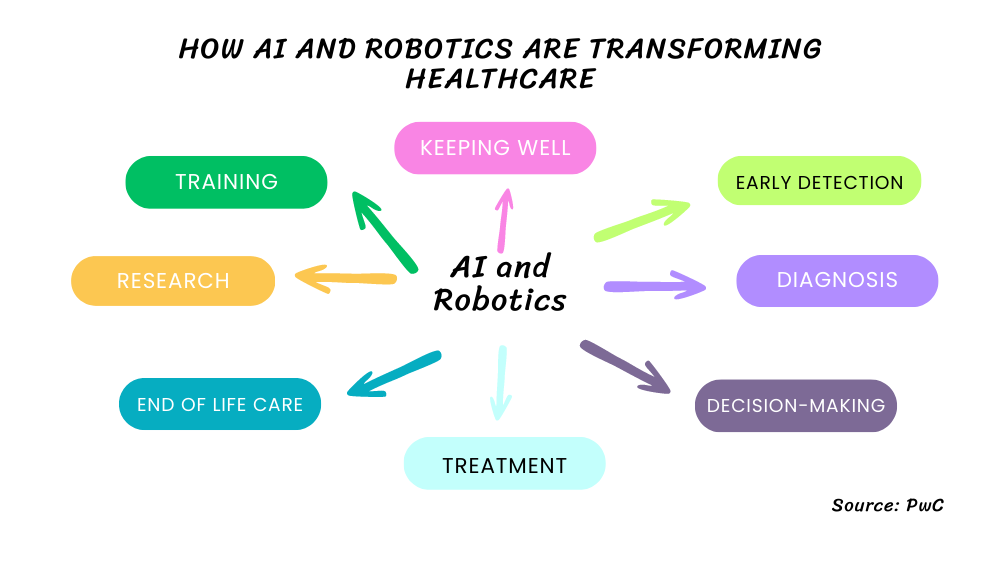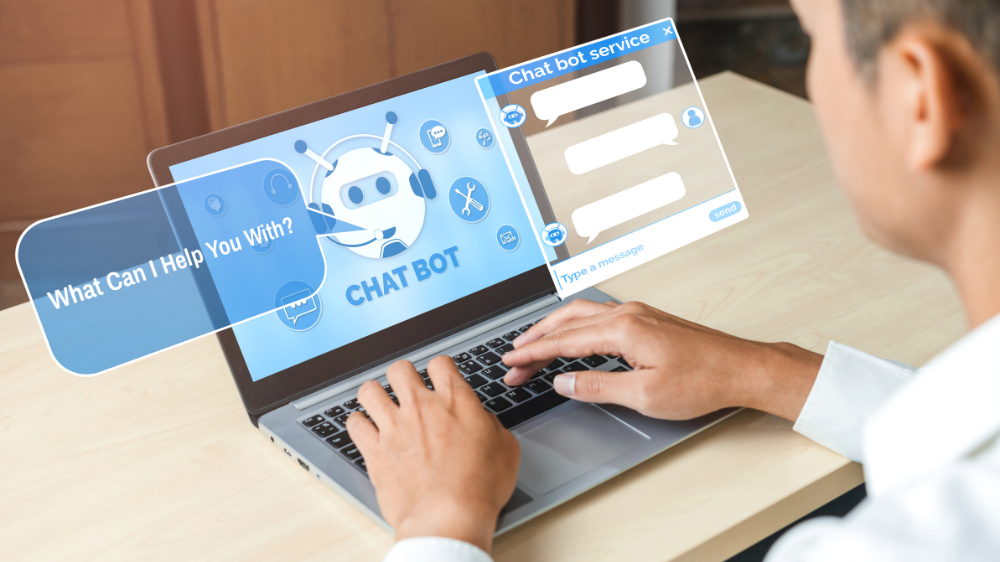- By Kirsten Gonzalez MSN, APRN, ACNP-AG
Artificial intelligence (AI) in healthcare evokes feelings of excitement, transformation, and uncertainty. All are valid feelings, as artificial intelligence has many pros and cons associated with it. This blog post will explore the potential risks and benefits of AI’s incorporation into healthcare. The reality is artificial intelligence is not going away. The question is, should your healthcare business be worried about AI?
How Will AI Specifically Affect Healthcare Businesses?
Artificial intelligence is finding its home in healthcare and causing a transformation in the industry. There are many ways AI innovation aids in healthcare delivery, including the development of algorithms. These can improve performance in the clinical decision-making process. Some will assist providers with electronic health record (EHR) documentation. Others will data mine information to find people at risk of health disorders.

For healthcare businesses, AI focuses on reducing the amount of mundane or time-consuming tasks in the provider’s workflow. The idea is to augment or automate the job and reduce the challenges of time constraints. This process will allow for increased patient engagement and less time with the computer.
Examples of AI’s Role in Assisting Healthcare Professionals
Currently, AI is helping radiologists with their workloads. While the healthcare professional reads the scan to rule out a diagnosis, AI tries to rule in diagnoses. It can also detect diagnoses, such as acute kidney injury (AKI) or sepsis, more quickly than clinicians. AI does this by performing surveillance for symptoms associated with these diagnoses in the EHR.
In the hospital setting, AI is detecting signs of sepsis through early warning systems. Machine learning does this task in the EHR by using surveillance to find a collection of symptoms associated with the risk or development of sepsis. The system then pages the team with this EWS notification to evaluate for sepsis.
These resources are invaluable to healthcare companies caring for masses of patients. Both sepsis and AKI increase hospital length of stay and healthcare costs. Early recognition will also reduce the likelihood of the long-term effects of these illnesses. In this way, artificial intelligence will augment healthcare delivery.

The use of AI in healthcare can reduce racial disparities. AI aids in protecting patients from implicit bias, an automatic prejudice that affects people’s judgments, decisions, and behaviors. Algorithms collect data, in theory, without prejudice. Because people of color tend to go without healthcare due to this bias, AI can help provide a solution.
Another issue in healthcare is access to care for geographical reasons. People in rural areas don’t have the same access to care as those in urban areas. Artificial intelligence allows providers in rural areas to collaborate more efficiently with those in urban areas. It also assists rural healthcare professionals by providing resources within their EHR to better care for their patients.
Specific Steps Healthcare Businesses Can Take to Prepare for AI
Artificial intelligence may be a foreign concept to your business, and that’s okay. Here are a few steps to get you started on implementing AI into your healthcare business.
- Assess training needs concerning AI. Strategize where AI will do the best for your healthcare business, and start there. Focus on training and optimization while assessing the next steps to tackle. For example, if your company reads scans of patients, it would be logical to invest in AI that reads scans to increase the volume of scans read.
- Implement policies in response to the ethical challenges AI presents. Ensure your healthcare business has policies to cover the potential ethical challenges of implementing AI. The first is developing a consent form for the patient to allow your healthcare business to use data. Another policy required involves data privacy. Ensure that only the people who need the data to perform their job duties can access it.
- Build partnerships with other businesses using AI. Networking is huge in healthcare, and technology is a rapidly changing industry. Use your network to talk with other owners of healthcare businesses about how they currently use and will use AI, what kind of bumps have occurred along the way, and how they have overcome those challenges. What you discover in these partnerships will influence how you implement AI in your business and help you work out the kinks more quickly.
How Can Healthcare Businesses Ensure That Their Data Is Secure When Using AI?
Because AI is frequently changing, it presents challenges from a governance standpoint. The development of artificial intelligence laws and regulations struggles to keep up with the new technologies. Healthcare businesses can ensure data security by following the most recent regulations and privacy laws.
Be mindful of what you upload into the AI database. De-identification, or removing personal information, is critical for protecting your patient’s private health information. Also, technology is advancing in such a way that multiple entries of de-identified data can become identifiable by association.
Vendor due diligence is vital to the protection of health information. Find out how the vendor collects data and where they store it. Identify if the vendor will use a method other than direct access to access data. Utilizing a separate database may be a safer route for your business.
Ensure your security safeguards are in place. Routinely audit and monitor your information systems. Maintain strict access controls regarding the level of access. Finally, train your vendors and employees on their data use, security obligations, and any limitations they may have.
Should You Be Worried About AI?
All in all, artificial intelligence will not be coming after our jobs any time soon. The need for more healthcare providers will likely increase with time. Because of this, AI may become essential to optimizing performance in care. As mentioned, you should use the investment in AI as a tool to make your job easier. So buckle up, learn more about it, and give yourself grace when the time comes for your company to add AI into its workflow. Tell others about your successes by hiring a healthcare content strategist and a nurse writer to aid you in telling others about how you became successful in implementing AI into your business.
References
Christensen, J. (2023, February 22). Most Americans are uncomfortable with artificial intelligence in health care, survey finds. CNN Health. https://edition.cnn.com/2023/02/22/health/artificial-intelligence-health-care/index.html
Health IT Analytics. (2022, March 2). Arguing the pros and cons of artificial intelligence in healthcare. https://healthitanalytics.com/news/arguing-the-pros-and-cons-of-artificial-intelligence-in-healthcare
Kwo, L. (2021, July 1). Contributed: Top 10 Use Cases for AI in Healthcare. Mobi Health News. https://www.mobihealthnews.com/news/contributed-top-10-use-cases-ai-healthcare
Malek, L.A., Jain, P., & Johnson, J. (2022, March 17). Data privacy and artificial intelligence in health care. Reuters. https://www.reuters.com/legal/litigation/data-privacy-artificial-intelligence-health-care-2022-03-17/
Marr, B. (2022, September 14th). How AI And Machine Learning Will Impact The Future Of Healthcare. Forbes. https://www.forbes.com/sites/bernardmarr/2022/09/14/how-ai-and-machine-learning-will-impact-the-future-of-healthcare/?sh=53e8b7f47e5a
Maskey, S. (2022, October 4th). 3 steps to prepare your organization for the AI revolution. Training Industry. https://trainingindustry.com/articles/it-and-technical-training/3-steps-to-prepare-your-organization-for-the-ai-revolution/
National Institutes of Health. (2022, June 3). Implicit bias. U.S. Department of Health & Human Services. https://diversity.nih.gov/sociocultural-factors/implicit-bias
Naik, N., Hameed, B.M.Z., Shetty, D.K., Swain, D., Shah, M., Paul, R., Aggarwal, K., Ibrahim, S., Patil, V., Smriti, K., Shetty, S., Rai, B.P., Chlosta, P., & Somani, B.K. (2022). Legal and ethical consideration in artificial intelligence in healthcare: who takes responsibility?. Frontiers in Surgery, 9, 862322. https://www.ncbi.nlm.nih.gov/pmc/articles/PMC8963864/
Schinkel, M., van der Poll, T., & Wiersinga W. Joost. (2023, April 1). Artificial Intelligence for Early Sepsis Detection: A Word of Caution. American Journal of Respiratory and Critical Care Medicine, 207(7), 853–854. doi: 10.1164/rccm.202212-2284VP

About the Author
Kirsten Gonzalez MSN, APRN, ACNP-AG
Kirsten Gonzalez MSN, APRN, ACNP-AG, practiced as a Registered Nurse in the Medical/Cardiac Intensive Care Unit for nearly ten years and has taught three semesters of students as a clinical instructor for nursing students completing their critical care rotations. She now works as an Acute Care Nurse Practitioner working with patients with Advanced Heart Failure with Left Ventricular Assist Devices. She enjoys reading and spending time with her family.




